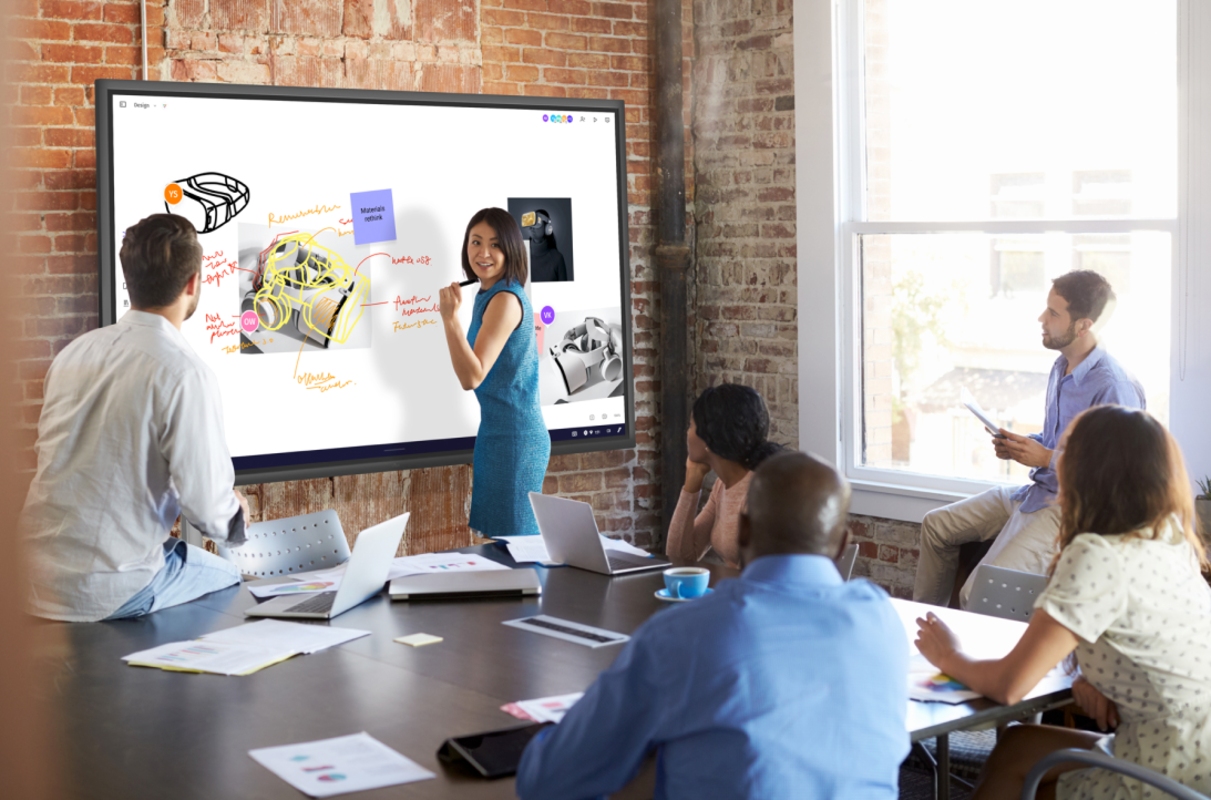While the number of remote workers continues to increase, your conference rooms are likely to see more use than ever before. Your conference room setup must be reliable, and it’s crucial to maintain the necessary components. Preparation is especially important for hybrid teams; remote and on-site workers benefit from a seamless meeting experience. So be the most prepared person in the room with this conference room checklist.
Check the video conferencing hardware
The first thing to do before your next meeting is to examine all of the conference room equipment. This includes:
- displays like laptops, desktops, tablets, projectors, and TV screens
- camera and microphones, including built-in computer equipment and any external devices
- speakers, whether they are components of a computer, TV, VoIP conferencing phones, or standalone systems
- internet connection points, whether it’s via WiFi or an Ethernet cable
- your video conferencing software that you’ll be using to make video calls, display meeting participants, and route the sound through
Ensure that everything is working correctly and note any hardware that might require an upgrade. (It’s always better to upgrade proactively. No one wants their conference room equipment to stop working in the middle of an important meeting.)
Related: Choosing the Best Headphones for Video Conferencing
Wireless internet connectivity and backup source
Wireless internet connectivity is essential for most things in the modern business world, and conference rooms are no exception. Wi-Fi technology makes all of your video conferencing hardware and software easy to use. Sometimes, though, Wi-Fi signals become spotty, weak, and unable to handle the amount of data needed for video meetings.
You’ll want to have a backup plan in case something happens to your Wi-Fi connection. Ideally, your conference room should include a hard-wired Ethernet backup. This way, if something does happen to your internet connection, you already have it covered.
Test the audio on the video conferencing
One thing that every meeting attendee loathes is poor audio quality during a video conference. When you can’t clearly hear or be heard, it can result in mistakes and confusion. So while you can rely on a laptop microphone in a pinch, we suggest using external microphones in your conference rooms.
The integrated laptop microphones are typically low-quality and cause your words to come out muffled or distorted. And in some cases, you’ll get voice echoing problems. Installing a system with high-quality microphones and speakers is one of the best upgrades you can make for your meeting room.
{{< blog/cta-1 “Vibe Interactive Whiteboard for Remote Collaboration” >}}
Optimize the conference room for full-view video
Upgrading to a full-view video system is another great way to increase productivity during meetings. If your remote employees are conferencing with your in-office team, you want them all to feel as present and engaged as possible. A 360-degree conference camera can help accomplish this by giving everyone a full view of the conference room.
You can even find smart cameras that allow for a full room view while highlighting whoever is currently speaking. This helps to make the video discussion feel more organic, breaking down the barriers employees usually feel during teleconferences.
Invest in a transportable video conferencing system
Wouldn’t it be great if you could move your video conference system from place to place with ease? Well, you can. Rather than utilizing technology in multiple conference rooms, you can purchase one set of devices and move them as necessary. You could take your video conferencing system to board meetings, other locations, or anywhere that you need to hold a meeting without worrying about moving your entire conference room.
Ensure the VC system works with 3rd party apps
Most offices have software they already use for video conferences (like Zoom), and it’s important to ensure that any upgrades you make are compatible with that software. You shouldn’t make your employees learn the ins and outs of new software every time you update your video conferencing system; implement solutions that seamlessly integrate into your existing workflows instead. (For an added bonus, find upgrades that coordinate with your company calendar app.)
Related: How to Make Your Conference Calls Sound Better
Walk through your presentation
Whether you made equipment upgrades or not while checking out your system, always set everything up and walk through your presentation prior to the meeting. This gives you time to fix any last-minute hiccups and make any necessary changes beforehand. Work out the bugs before your meeting so that you don’t have to worry about them during the conference.

Conference room must-haves (and nice-to-haves)
Here’s the absolute minimum hardware that you’ll need in your conference room:
- At least one camera or webcam
- At least one microphone
- A video display: a computer screen, TV screen, or projector
- A set of speakers
Don’t forget to include essential amenities on your checklist, like:
- Water bottles
- A sufficient amount of chairs
- Pens and paper
That’s all you need to run a basic conference, but there are some upgrades you can make to ensure your meetings go more smoothly:
- Digital meeting schedule displays
- Interactive whiteboards like Vibe
- 360-degree webcams
- Multiple displays, microphones, and speakers
Consult a conference room checklist for efficiency
When your conference room is set up for efficiency and productivity, it makes it easier for your team to communicate and collaborate intuitively. It’s crucial for your business to stay on top of your video conferencing setup, especially when many companies are adopting a hybrid remote/in-office workplace. Stay ahead of the curve, and implement video conferencing system solutions that your employees actually want to use.
Vibe offers a collaborative solution combining an interactive digital whiteboard and innovative smart software. Increase engagement and efficiency at your brainstorming sessions, virtual training, and classroom sessions by integrating your favorite applications with video conferencing and an infinite, mess-free writing canvas. Collaborate today with Vibe.
Looking for the latest in interactive whiteboard technology? Check out Vibe today!
